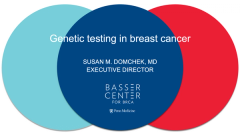
Educated Patient® Breast Cancer Summit at MBCC Treating Brain Metastases Presentation: March 4, 2023
Watch Dr. Rupesh Kotecha, from Miami Cancer Institute, Baptist Health South Florida, discuss the treatment of brain metastases during the CURE Educated Patient® Breast Cancer Summit at MBCC.
Episodes in this series

In the past, patients with breast cancer that spread to the brain were all treated with brain radiation. But now, there are more treatment options available that can be personalized to each patient, explained Dr. Rupesh Kotecha.
Kotecha, a radiation oncologist at Miami Cancer Institute, Baptist Health South Florida, recently discussed the management of brain metastases at CURE®’s Educated Patient® Breast Cancer Conference, held live and virtually at the Miami Breast Cancer Conference.
Treatment for Brain Metastases
Various factors play a role in the type of treatment and how much patients will receive to treat their brain metastases.
“We risk stratify patients, and how we individually select and personalize the options for every patient depends on a number of factors – such as the age, the performance status, the status of the extent of their disease, its stent, the number of lesions in the brain, the location of lesions in the brain – and we take patient input into that as well,” Kotecha said in an interview with CURE®.
Patients who have a good performance status — meaning that they are still able to do all or most of their daily activities unassisted —with limited cranial (within the skull) disease may be good candidates for drugs that target certain molecules found on metastatic breast cancer cells in the brain, with or without stereotactic radiosurgery.
For patients with breast cancer who have more extensive brain metastases, known as leptomeningeal disease, craniospinal radiation, where the entire brain and spine is treated with radiation, may be a better option, according to Kotecha.
“Breast cancer is associated with one of the highest survivals for brain metastases, which is fortunate,” Kotecha said. “So we need to take that information into account when we’re making our decision. For example, that’s why we often offer radiosurgery, for example, for breast cancer patients, even when they have multiple lesions, because they potentially (can) have a long-term survival, and we have seen that survival increases over time as a result mostly of additional systemic therapies that have better intracranial penetration and are able to target that disease in the brain.”
Detecting Brain Metastases
In addition to more treatments for brain metastases, early detection of breast cancer that has spread to the brain can also be key to survival. To ensure early detection, patients must speak up to their providers if they are feeling any neurological (brain and central nervous system-related) symptoms — especially since there are no current guidelines regarding monitoring for brain metastases for patients with breast cancer.
Kotecha said that patients should talk to their care team if they experience headaches, nausea/vomiting (besides what they typically see within their chemotherapy cycles), forgetfulness or confusion.
“Some of those (symptoms) are sometimes hard to differentiate from side effects from the treatments that they’re receiving, but if those symptoms persist, then that would be important to discuss with the health care team,” he added.
Additionally, Kotecha mentioned, patients should be aware that even if somebody is years out from finishing their treatment, “breast cancer is one of those rare tumor types that can relapse in the brain later, even after the patient has been treated and cured of their primary disease.”
Clinical Trials Drive Progress in Metastatic Breast Cancer
Looking ahead, Kotecha said that clinical trials — including some that are being conducted at his institution — will continue to drive progress forward and improve outcomes for patients with breast cancer who have brain metastases.
“I believe that patients are best treated on clinical trials, both for the (sake of) the patient and advancing science,” Kotecha concluded. “I advocate for any patient to always ask their physician and other clinicians about any potential clinical trials at their facility — or another facility that they can travel to — that they would be eligible for.”
For more news on cancer updates, research and education, don’t forget to



















